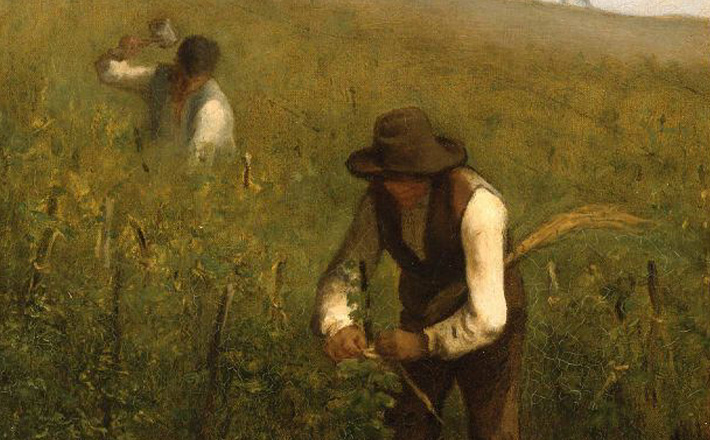Commentary on Isaiah 5:1-7
In the classical show tune, “My Funny Valentine,” Billie Smith sings an ironic love song, describing her lover’s imperfections:
“Your looks are laughable, unphotographable, yet you’re my favorite work of art.”
Despite these many imperfections, or perhaps even because of them, Billie encourages Val, “But don’t you change one hair for me, not if you care for me. Stay little valentine stay. Each day is valentine’s day.”1
Music remains one of the most poignant ways in which to express love. This was also the case in ancient Israel and Judah. Isaiah 5:1-7 plays on the genre of a love song, once again using the marriage motif to describe the relationship between God and God’s people. Yet the irony here cuts more to the quick than it does in “My Funny Valentine.” In this passage, the prophet recomposes the love song into a lament over the nation’s betrayal of God’s principles.
The prophet uses the metaphor of the constant care of the vinedresser for the vineyard as the primary trope throughout this passage. First, the prophet recounts the vinedresser’s tender care and hard work in the vineyard. The song describes the cultivation of the land, the planting of the best stock of vines, and the construction of a protective watchtower and a perfect wine press. Despite even the Divine Vinedresser’s best efforts, the vineyard yielded “wild grapes” (beu’shim). The term suggests that not only are the grapes unusable, but that they emit a rancid odor.
God asks the people of Judah to judge for themselves what they think should be done with the stench of such an offensive, unproductive vineyard. Here we glimpse God’s inward emotional frustration at the detestable fruits of Divine labor: “What more was there to do for my vineyard that I have not done in it? When I expected it to yield grapes, why did it yield wild grapes?” (verse 4).
In response to this frustration, God continues to use agricultural imagery to describe the devastation that he will wreak on this despicable vineyard. Verses 5-6 negatively mirror verse 2. Instead of building a watchtower for the vineyard, God will remove its protective hedge, allowing it to be ravaged by the wild. Instead of planting choice vines, God will allow briars and thorns to overtake the vineyard. God will neither till the soil nor prune the vines. God will hold back even the rain from the vineyard so that it will languish in drought.
In verse 7, the prophet translates the metaphor: the vineyard is the house of Israel and its vines are the people of Judah. The prophet punctuates the metaphor with two puns in Hebrew. First, the sweet wine that God desires was justice (mishpat), but instead, the people produced bloodshed (mishpach). The latter term has caused many interpretive problems and may be related to the Arabic term which means “to spill,” or alternatively, “to spill blood.”2 Given the scope of the metaphor, and assuming the wine produced was red, there could be further play on the imagery of bloodshed in comparison to the dripping of red wine.
Second, God also anticipates “righteousness” (tsedeqah) but has instead heard only a “cry” (tse‘aqah). The latter term in this pun recalls the outcry against the violent people of Sodom (Genesis 18:21; 19:13) as well as the cry of the Hebrew people in light of the abuse of their taskmasters (Exodus 3:7-9).
Unlike “My Funny Valentine,” in this passage, God describes all of the attributes that God granted to the people of Judah that should have yielded the perfect wine of justice and righteousness in their society. Despite all of their divinely-granted privileges, however, the people snubbed justice for bloodshed and righteousness for the wailing of the oppressed. The bitter irony in God’s mournful lament results in the divine rejection and punishment of God’s people.
Within the context of Isaiah, one can easily discern the types of injustices that Judah perpetrated: they do not defend the cause of the widow and orphan (1:23), they coveted and stored up wealth for themselves (1:29), they oppressed the poor (3:14-15), they acquitted the guilty and deprived the innocent of their rights (5:23).
Many who choose to preach on this text may find themselves preaching in a congregational setting of similar privilege. Indeed, the ideals of justice and injustice in our society are ever more apparent in the cacophonous media. High-profile court cases and media coverage of war abroad and poverty within indeed amplify the cries of injustice in our society. In congregations of privilege, this passage becomes a challenge. Are we using our privilege to produce the sweet wine of justice in our society? Or does our propensity to cower behind privilege result in the stench of injustice that will ultimately repulse the God whom we claim to worship? Do we set out on quests for righteousness in our society, or are our actions representing the Church creating more harm than good?
Some, however, might find themselves preaching in a congregational setting of disenfranchisement. In this setting, God’s words of condemnation towards the comfortable actually might be words of hope in the ears of the oppressed. Just as God heard the outcry of the oppressed in Egypt, God hears the cry of the oppressed today and is indignant. God intends to use God’s people to promote justice and equity. We can echo God’s love and care for the church by carefully cultivating justice in our society.
Notes:
1Richard Rogers and Lorenz Hart, “My Funny Valentine,” from the 1937 musical Babes in Arms.
2Wildberger, Hans. Isaiah 1-12: A Continental Commentary, trans. Thomas H. Trapp (Minneapolis: Fortress Press, 1991), 185.


August 18, 2013